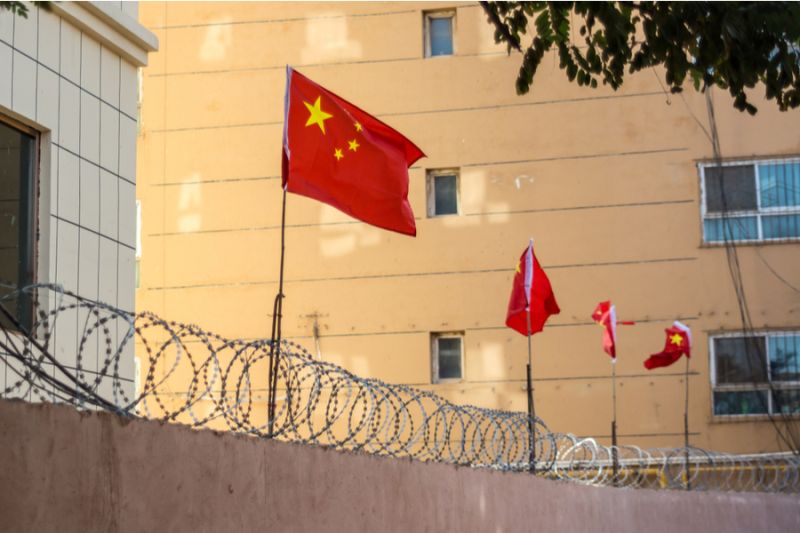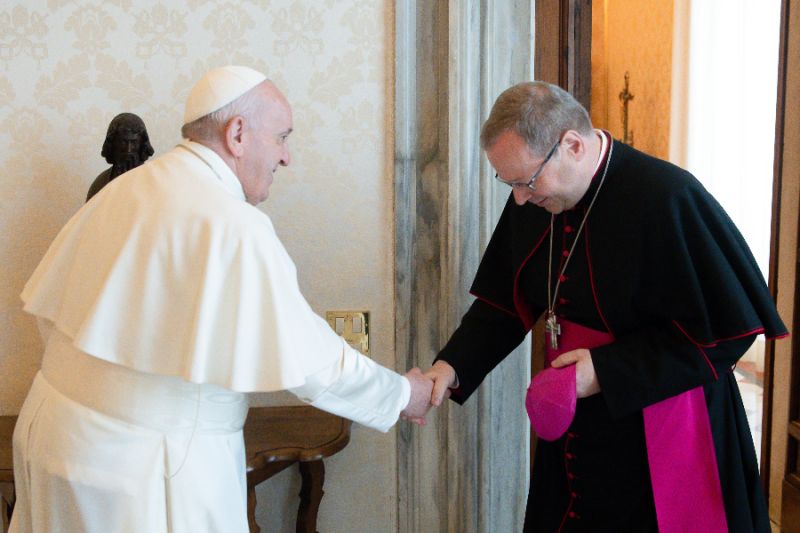Chinese priest convicted of ‘fraud’ for refusal to recognize state-sanctioned Church

 Chinese flags on barbed wired wall in Kashgar (Kashi), Xinjiang, China. / Credit: Jonathan Densford/Shutterstock
Chinese flags on barbed wired wall in Kashgar (Kashi), Xinjiang, China. / Credit: Jonathan Densford/Shutterstock Rome Newsroom, Sep 15, 2023 / 18:50 pm (CNA).
A Catholic priest in China was convicted of “fraud” and “impersonating religious personnel” on Sept. 13, ChinaAid reported.
Father Joseph Yang Xiaoming of the Wenzhou Diocese in Zhejiang, China — south of Shanghai — was found to be in violation of the law after he refused to register with the state-sanctioned Chinese Catholic Patriotic Association (CCPA).
The court-imposed administrative penalties on Yang include “the cessation of his [priestly] activities, the confiscation of illegal proceeds of 28,473.33 yuan ($ 3,913), and a fine of 1,526.67 yuan ($ 210),” UCA News reported. In May 2021, shortly after his ordination, the Longwan District Religious Affairs Office started legal proceedings against Yang.
Yang reportedly challenged the allegations by presenting a valid certificate of ordination in court “issued by the bishop of Wenzhou and both the Longwan District Religious Affairs Bureau,” in which “the Longwan District government … recognized the authenticity of the document in court, thus acknowledging that he was ordained according to the rules of the Catholic Church.”
According to AsiaNews, Yang Xiaoming, 33, was born in Longwan, a district of the city of Wenzhou, Zhejiang province. He was ordained in 2020 by Bishop Peter Shao Zhumin.
Zhumin was made coadjutor bishop of the Diocese of Yongjia in 2011 and bishop of the diocese in 2016, both times with a papal mandate; he was not, however, approved by the CCPA. Zhumin repeatedly refused to recognize the CCPA and, in turn, has been detained multiple times, most recently on Feb. 18. There have been no updates as to his status or whereabouts, ChinaAid reported.
CCP’s increasing oversight of religious activity
In the last five years, there has been an accelerated centralization of government oversight of religious activities in China. In 2018 the National Religious Affairs Administration (NRAA), formerly known as the SARA, was put under the United Front Work Department (UFWD), which is under the direct control of the party’s Central Committee.
In December 2019, the Administrative Measures for Religious Groups was published, which went into effect on Feb. 1, 2020. This 41-article document enacted stricter provisions for religious expression by imposing new rules on the structure, function, and administrative oversight of religious groups.
According to an English translation of the document provided by Bitter Winter, a religious liberty and human rights magazine, Article 3 states: “Without the approval of the religious affairs department of the people’s government, or registration with the civil affairs department of the people’s government, no religious activities in the name of religious organizations are allowed.”
Article 17, which concerns the conduct and role of the clergy, states that clergy members should abide by the directives of the Communist Party of China.
“Religious organizations should publicize the guidelines and policies of the Communist Party of China, national laws, regulations, and rules to the clergy and religious citizens, in order to instruct and direct the clergy and religious citizens to support the rule of the Communist Party of China, support the socialist system, follow the path of socialism with Chinese characteristics, abide by the laws, regulations, rules and policies, correctly treat the relationship between state laws and religious rules, and strengthen their national consciousness, consciousness of rule by law, and consciousness of one’s duty as a citizen,” the document says.
In 2021 the SARA issued another new regulation further curtailing the freedom of religious groups: the Measures on the Management of Religious Clergy. This law implemented even stricter control and guidelines for clergy, imposing greater penalties. Article 3 reiterates the need for clergy to be loyal and to “adhere to the direction of the Sinicization of religion in China, operate to maintain national unity, religious harmony, and social stability.”
The regulation goes on, introducing two novel elements. The first is seen in Article 8, which states: “Religious clergy, when publishing religious information on the internet, should comply with the relevant provisions of the national internet information regulations.”
And then, in what is seen as its most pernicious feature, Article 33 states: “The State Administration of Religious Affairs shall establish a database of religious clergy, the local people’s government departments of religious affairs should provide and update the basic information of religious clergy, including awards and punishments, cancellation of records, and other information.”
On May 23, the database for Catholic clergy was finally launched. Registration is compulsory and should any clergy member be found guilty of breaking any of the rules, his official membership can be canceled and religious functions suspended.
While government officials maintain that the database was created to crack down on fraudulent clerics, the case of Father Yang reveals that it is a pretense to strong-arm obstinate clerics into registering with state-sanctioned religious bodies — it is a concrete application of the 2021 Measures on the Management of Religious Clergy.
Yang’s arrest is the latest example of the government’s attack on Catholic clergy and highlights a broader concern over the trajectory of religious liberty in China.
It also comes after Pope Francis’ visit to Mongolia. At the end of the papal mass in Ulaanbaatar on Sept. 3, the Holy Father took a moment to greet the bishop emeritus of Hong Kong, Cardinal John Tong Hon, and the current bishop of Hong Kong, Cardinal-elect Stephen Chow Sau-yan, SJ.
“These are two brother bishops, the emeritus of Hong Kong and the current bishop of Hong Kong,” the pope said. “I would like to take advantage of their presence to send a warm greeting to the noble people of China. To all the people I wish the best. Strive ahead, always advancing. And I ask Chinese Catholics to be good Christians and good citizens.”
Italian Cardinal Matteo Zuppi was in Beijing this week as the pope’s special envoy to help promote peace and humanitarian initiatives in light of the ongoing war in Ukraine. Thus far the Holy See has not made any statement on Yang’s conviction.





